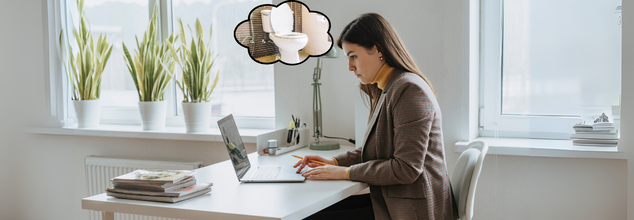
Image Credits: Health and me
How Harmful Is It To Delay Your Bathroom Breaks?
Your bathroom is often the place where your mind is at its most active, a personal space where thoughts flow freely. But in today's digital age, this once-private moment is now shared with your smartphone, making it easier to ignore your body's natural cues. Whether you're at work, in public, or even around a significant other, many people hesitate to use the restroom when nature calls. But do you ever consider how bad it is to hold off on bathroom breaks?
Bragging about holding in pee or poop for a long time isn't a flex—it's unhealthy. Doing it over and over can cause your bladder to weaken, strain your colon, and lead to severe health complications such as infection, constipation, and even kidney disease. Listen to your body; holding off can cause long-term effects that aren't worth the risk.
Denying your body the opportunity to dispose of waste can result in a number of health complications, from mild discomfort to serious digestive and urinary complications. While at times holding it in may not have long-term effects, developing it as a habit can have disastrous consequences on your overall health.
We have all at some time or another pushed the need to use the bathroom, because of a critical meeting, an uncomfortable social situation, or just plain obstinacy. Holding it every now and then is probably not going to cause lasting harm, but repeated holding can cause serious health consequences.
As you hold bowel movements, your colon will keep drawing water out of the stool, so it becomes drier, harder, and more difficult to pass. This raises the potential for constipation, which has the potential to cause painful hemorrhoids and anal fissures. These tiny ruptures in the lining of the anus can create a great deal of pain as well as bleed. In some cases, habitual retention of stool can result in fecal impaction, with hardened stool remaining lodged in the colon and requiring professional help.
How Long Can You Hold It?
The effect of postponing a bathroom visit also depends on individuals. While a 1-2 hour hold might develop bloating or slight discomfort, holding it for several hours may cause serious problems.
1-2 Hours: Slight discomfort, bloating, and accumulation of gases.
4-5 Hours: More water from the stool is absorbed by the colon, which becomes difficult to pass.
10+ Hours: Higher chance of constipation, pain, and straining to pass stool.
Chronic Holding: Potential injury to the rectal muscles, resulting in long-term bowel abnormalities.
Repetitive holding of stool can, over time, stretch and weaken the colon muscles, causing long-term gastrointestinal problems like chronic constipation or even bowel disorders caused by bacterial imbalances.
What are the Risks of Holding Your Pee?
In contrast to stool, urine builds up more quickly, and not urinating on time has consequences of its own. The bladder that carries urine is meant to hold about one pint (or two cups) of fluid. When you always hold urine, though, the bladder elongates past its normal capacity, and the muscles that are supposed to empty it might get weakened.
Urinary Tract Infections (UTIs): Delayed urination provides a time for the bacteria to grow in the urinary tract, raising the chances of infection.
Bladder Dysfunction: With time, muscles of the bladder can weaken, such that it is hard to fully empty the urine. This can result in chronic urinary retention, when urine stays in the bladder even after visiting the bathroom.
Kidney Stones: For those with a history of kidney stones, holding urine in can lead to stone development because minerals in urine can form crystals when not cleared out regularly.
Pelvic Floor Damage: Constantly holding urine puts stress on the pelvic floor muscles, which help to maintain bladder function. Eventually, this can result in urinary incontinence.
Can Holding It In Make You Sick?
In extreme cases, withholding bathroom use can result in vomiting and nausea. If stool or urine is not released on time, waste can accumulate in the intestines or bladder, leading to pain and, in extreme cases, infection or obstruction. If nausea or vomiting happens after long-term stool retention, it can be a sign of a serious condition that needs urgent medical attention.
Tips for Building Healthy Bathroom Habits
To prevent the issues involved with procrastination when taking bathroom breaks, use these easy tips:
Listen to Your Body: Do not push it to the limit and delay visiting the restroom. It is best to go immediately as soon as the urge hits.
Schedule Bathroom Breaks Regularly: If your work is demanding, make a routine to take regular trips to the restroom so you won't hold it for a long time.
Stay Hydrated: Drinking lots of water keeps stools soft and removes toxins from the urinary tract.
Consume High-Fiber Foods: Eating foods rich in fiber facilitates regular bowel movements and prevention of constipation.
Practice Good Hygiene: Keeping good restroom habits can avoid infections and ensure long-term digestion and urinary health.
While an occasional delay in using the restroom is not a cause for alarm, making it a habit can lead to uncomfortable and sometimes serious health issues. Your body sends signals for a reason, ignoring them can have long-term consequences. So the next time nature calls, don’t ignore it, your health depends on it.
© 2024 Bennett, Coleman & Company Limited

